
When BP Koirala returned from America in 2034 BS after undergoing treatment, several of us from the hostel gathered at the airport to meet him. We didn't get to witness BP, but many people were attacked by the anarchic band of autonomous government. From tearing BP Koirala's wife Sushila's saree at the airport to attacking people who came to see him, the police kept mute, even when the attacks were horrendous.
The attack on the group killed Bishwanath Adhikari (Lamjung), Gopal Parajuli (Nawalparasi, subsequently Chief Justice), and Minendra Rijal. We escaped. We had heard that when this same gang and the police collaborated to instill panic at Tribhuvan University Kirtipur in 2032 BS, Bijay Sigdel, Devendra Nepali, and Hari Neupane were nearly killed. Twenty-two people, including BC Malla, Pitambar Dahal, Hiranyalal Shrestha, Sahana Pradhan, Rajeshwar Acharya, Durga Pokharel, Birendra Bhakta Shrestha, Arjun Narsingh KC, Arun Kumar Jha, Jayaprakash, and Narayan Acharya, as well as two other employees, were fired from teaching and service for inciting students to protest. It was a time when criminals were glorified and those who stood up for justice and conscience were punished.
Despite this, we continued to organize meetings at the hostel every night, as well as events to promote democracy. Tej Prakash Pandit and Harikrishna Poudel, both from Tanahun, were also involved in the hostel; however, once several of the leaders departed, they moved into teaching and government service. Nonetheless, the new friends that were present were just as active. We also began to communicate with other friends outside the hostel. At the moment, the names that spring to mind the most are Gopal Parajuli, Badrinarasingh KC, Kedarnarsingh KC, Narayankaji Shrestha, Suresh Malla, Rajendra Wagle, Prakash Sharan Mahat, Homanath Pokhrel, Padam Pokhrel (Gorkha), etc. We also traveled with Shiva Bhurtel, Benupraj Prasarain, Bal Bahadur KC, Pramod Parajuli, and Keshav KC. Even if you don't recognize Keshav Babu KC of Solukhumbu Salyan, Shiva Adhikari (Dhading), or Ram Krishna Ghimire of Chitwan, they were visible at the head of the parade.
In 2035 BS, the government assassinated Yagya Bahadur Thapa and Bhim Narayan Shrestha. Gopal Parajuli, Dayanath Kharel, Ram Prasad Gaudel, and Ram Chandra Khadka were among those organizing a protest parade. We also participated, but it did not take the form of a movement. Previously, in 2034 BS, at the idea of Rishikesh Shah, the human rights group Amnesty International Nepal prepared an event to celebrate International Human Rights Day at Birendra Keshari Pokharel's house in Kalikasthan on December 10th.
Damannath Dhungana, Kusum Shrestha, Marshal Julum Shakya, Nutan Thapaliya, Tilak Shahi, and Krishna Prasad Bhandari were among the many people present, as far as I recall. Journalists were also there, including Homnath Dahal. In a non-party dictatorship, discussing human rights would be worthless. Some of us students had also attended the gathering. The cops intervened, and the show could not be completed.
On International Human Rights Day, 25th Mangsir 035, (December 10th), we staged a big program in the Sanskrit hostel. There, I gave my first public political speech. There were several of us present that day, including Gopal Parajuli, Uma Regmi, Meena Pandey, and Brataraj Acharya. Gopalji and Uma Regmi delivered a rousing speech. It was agreed to organize a parade after the address. Placards were also ready. There were slogans against the non-party system. The procession was slowly exiting the hostel door.
I was up front. Two police inspectors stood at the entrance. I knew both of them. One was Sharada Prasad Parajuli and the other was Gopal Pathak. Parajuli's brother lived in Bandipur, Siraha. We had met before. He called me brother. Gopal Pathak hailed from Chitwan. Because he was alongside Sharada, he also used to address me as brother. Sharada was once a member of National Independent Students’ Union, and Gopal was a member of the Nepal Students' Union, but they were so close that no one could claim they had different political beliefs. Both of them approached me and said, "Look, there is an order to beat and disperse, but we have instructed our boys to hit the ground with sticks and not hit anyone, but we will remove the placards."
The procession continued. We slowly made our way to New Road from Bishwajyoti, going via Ratna Park and Bir Hospital. As soon as we arrived, the police used force. They removed the placards but did not strike anyone. The Panchayati Raj's marijuana traffickers killed Gopal Pathak in Siraha. His son, Sharad Pathak, is an active politician. Sharda became DIG upon the introduction of multi-party politics. He has also passed away. Everyone was aware that the parade event had abruptly elevated the political climate to a new level.
The deaths of Thapa and Bhim Narayan Shrestha in 2035 were progressively causing uproar among Democrats. Meanwhile, once the letter pads of the Nepal Students' Union were seized, Myself, Sunil Dahal, Tulsi Poudel, and Dinesh Poudel were detained. Tej Prakash Pandit remained underground for several days. The police involvement and arrests during the parade to the Pakistani embassy in Nepal to present a protest letter on the pretense of the military regime's hanging of Pakistan's then-Prime Minister, Zulfikar Ali Bhutto, escalated the situation.
The police apprehended Gopal Parajuli and Bal Bahadur KC. I immediately began providing Nepal Times with all of the latest information regarding the movement and arrests. Chandralal Jha was also daring. He continued to talk about chopping down trees by bending the Panchayat's branches. I've been a journalist since 2035, Jestha. My function was tripartite. First, conduct research, followed by journalism, and last, participate in the movement as an activist.
Following the Bhutto affair, a student movement was formed. Sher Bahadur Deuba, President of the Nepal Students Union, stated that there should be no movement, but Ram Chandra Paudel, Machhindra Pathak, Chiranjivi Wagle, Benupraj Prasai, Shiva Bhurtel, Pradeepman Singh (eldest son of Ganeshman Singh), Gangadhar Lamsal, and all of our friends supported the movement. We were continually distributing leaflets and coordinating at night, declaring that we would lay the groundwork for the movement. Meetings were convened at leader Arjun Narsingh's rented room in Kaladhara.
We, along with Suresh Malla, Badrinar Singh KC, Kedar Narsingh KC, Prakash Sharan Mahat, Narayan Kaji Shrestha, Homanath Pokharel, Rajendra Wagle, and Tej Prakash Pandit, attended that conference several times and roamed about distributing pamphlets. There were more pals, but I can't recall them right now. After distributing pamphlets late at night, Suresh Malla and I would go to sleep in the shelter where my elder brother Maniraj Wagle and his buddy Chudamani Kafle slept. Later, my nephew Kulprasad Koirala arrived and began residing there.
We arrived at the shelter in Chhetrapati, Dhobi Chaur, late one night after distributing leaflets, and were quickly encircled by cops. Suresh came out from behind and dashed towards the fields. I was stuck there. In the morning, Keshav Kharel, Ramchandra, and Hari Bahadur Malla arrived and detained me, so I went to the Hanuman Dhoka police station. Benupraj Prasai and Shiva Bhurtel were recognized as the movement's leaders. Benup and Shiva Bhurtel's student leadership was also capable of driving the movement.
BP Koirala believed that it was inappropriate to squander power in minor movements, so some allies backed down; nevertheless, once BP supported the demand for class interests at all times, the movement began with twenty points, then four more, and finally twenty-four points. The Communist Student Organization was commanded by Sharan Bikram Malla, Kailash Karki, and Bharat Pokhrel. Prabhat Mani Dixit (Mahesh Mani Dixit's son) commanded the Student Federation. Bhimsen Das Pradhan, a close associate of Ganeshman, attended a meeting hosted at a Chhetrapati residence, and Hisila Yami traveled from Delhi to attend. There was an excellent debate on running the movement.
Friends were arrested in droves. The movement accelerated. All of the leaders were placed under house arrest. I was involved in everything from writing news to creating brochures and delivering fliers. Finally, I got arrested. To put a halt to the movement, the administration evacuated all hostels. Sanskrit hostel was also evacuated. Friends were left in chaos. Toyanath Pandey was the assistant dean. He recognized the youngsters' hardship and arranged for their travel fees. Finally, the government had to concede to the movement. Even though the students had not requested it, the national independent students' union, which was known as a gang of non-party panchayats, was disbanded. A royal commission was established to address the students' demands.
We also have increased demands on the Valmiki Campus. We received requests for quilts and mattresses for students staying in the hostel, an increase in the amount of food, and an increase in scholarships for those receiving them on campus, including the library. Toyanath Guru, as is his custom, initially chastised us but subsequently consented. I and Brataraj Acharya signed on behalf of the students, while the Guru signed for the administration. This achievement helped me get greater recognition among my friends.
The students that were fired, Mandala and Masal Group, began to protest the government's decision. They accused the Congressmen of betraying the Masal Agreement and playing politics, while they were concerned about losing their mandala domination. Although we were released from jail at the conclusion of Baisakh, the leaders remained under house arrest. The student movement was fully supported by communists such as Manmohan Adhikari, Tulsilal Amatya, Bishnu Bahadur Manandhar, Hemant BC, Nar Bahadur Karmacharya, Siddhilal Singh, Qamar Shah, Mahesh Mani Dixit, Lok Krishna Bhattarai, among others.
Many of them were in prison. BP Koirala was under house arrest, while Ganeshman Singh, Krishna Prasad Bhattarai, Mangala Devi Singh, Marshal Julum Shakya, Omkar Shrestha, Birnath Karmacharya, Jagannath Acharya, Bipin Koirala, and Sher Bahadur Deuba were all in jail. The students were released, but the leaders were not. We discussed it and came to an agreement that it may seem as a political demand to call for the release of leaders, we should conduct a demonstration with a single demand: Release Our Guardians. To Be Continued…
This is a translated version of an excerpt from Prof. Purushottam Dahal's unreleased book "Smriti Parikshya." Prof. Dahal is the Editor-in-Chief of the Himalaya Times National Daily.

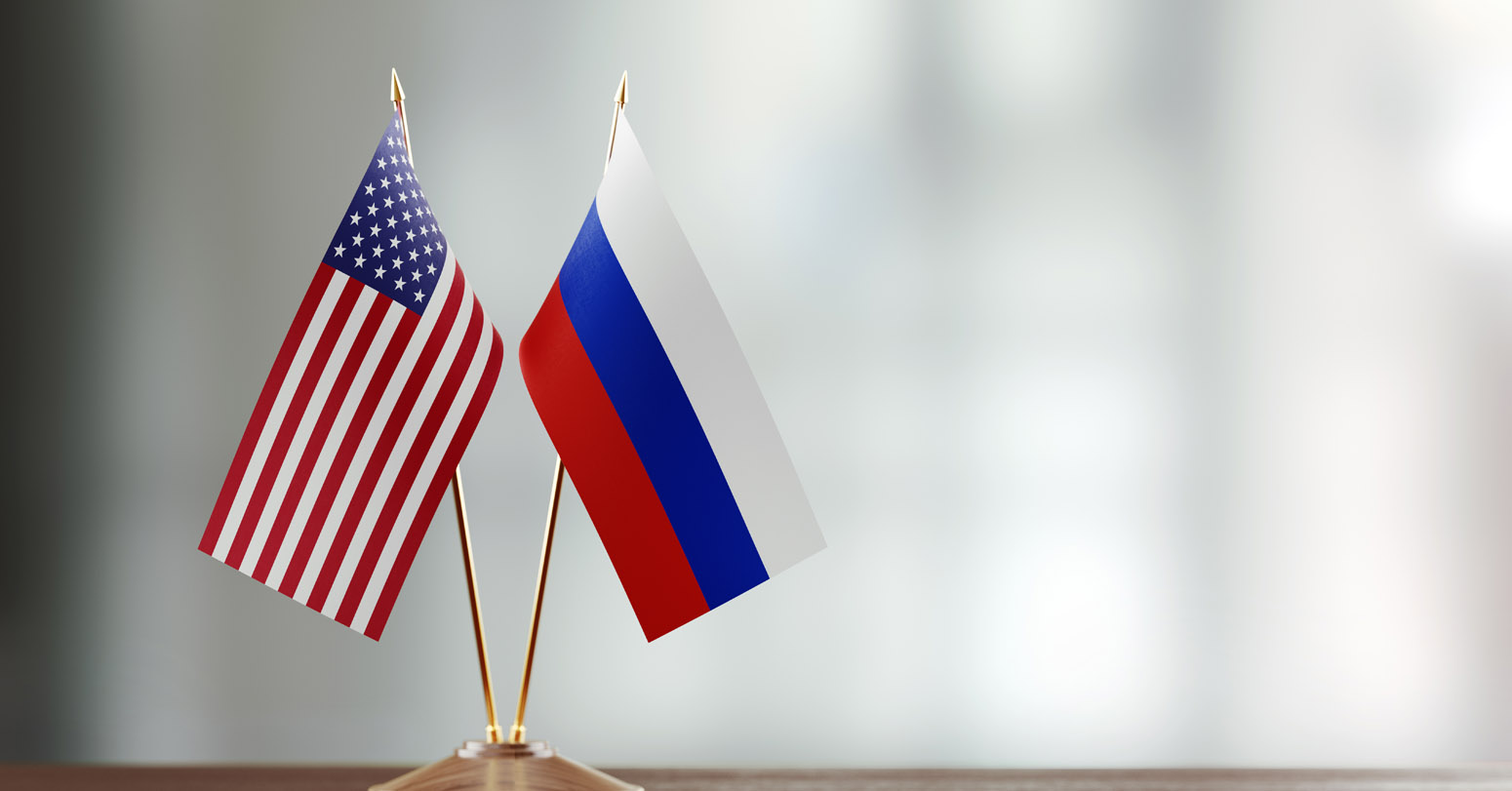
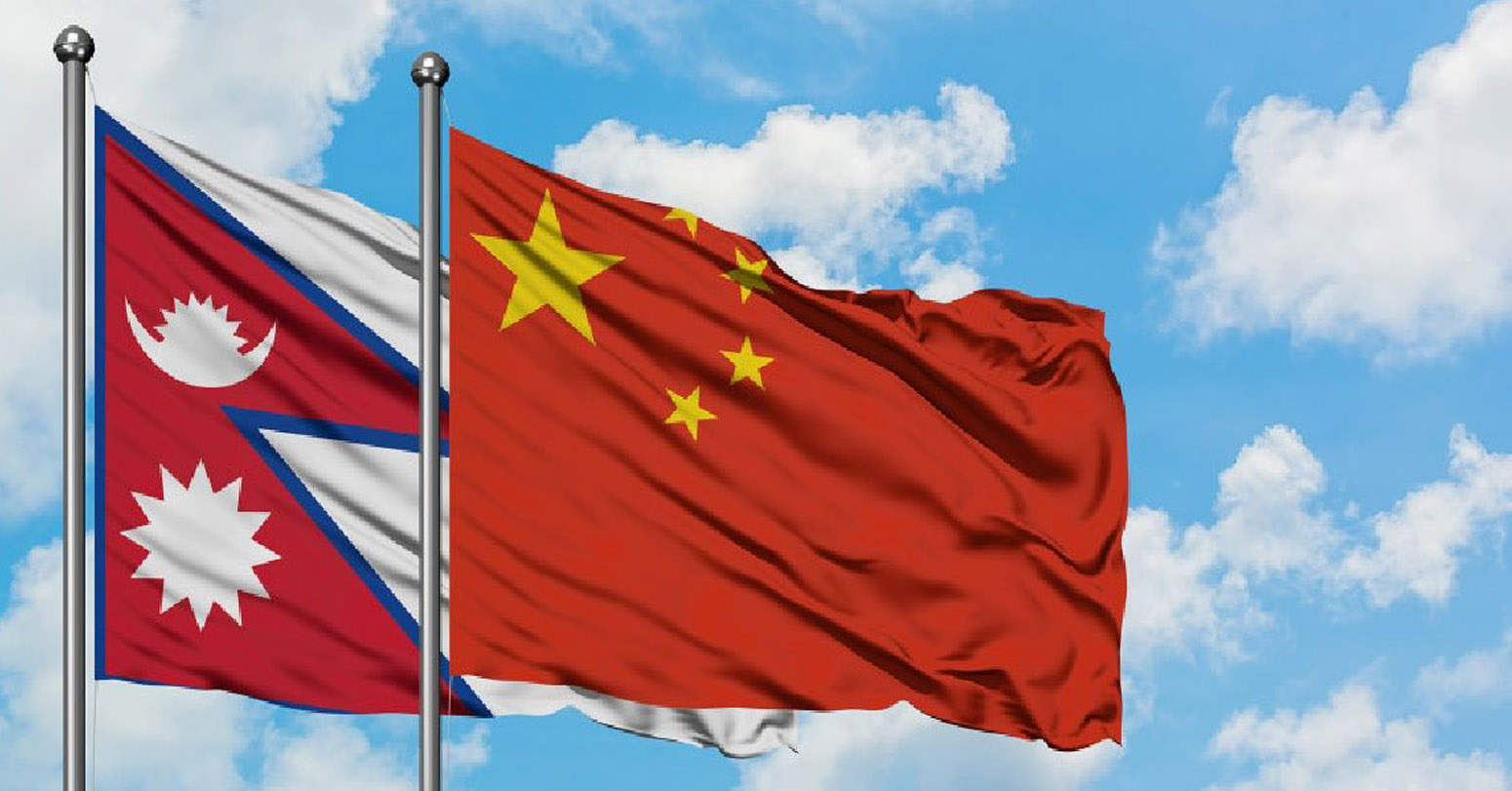


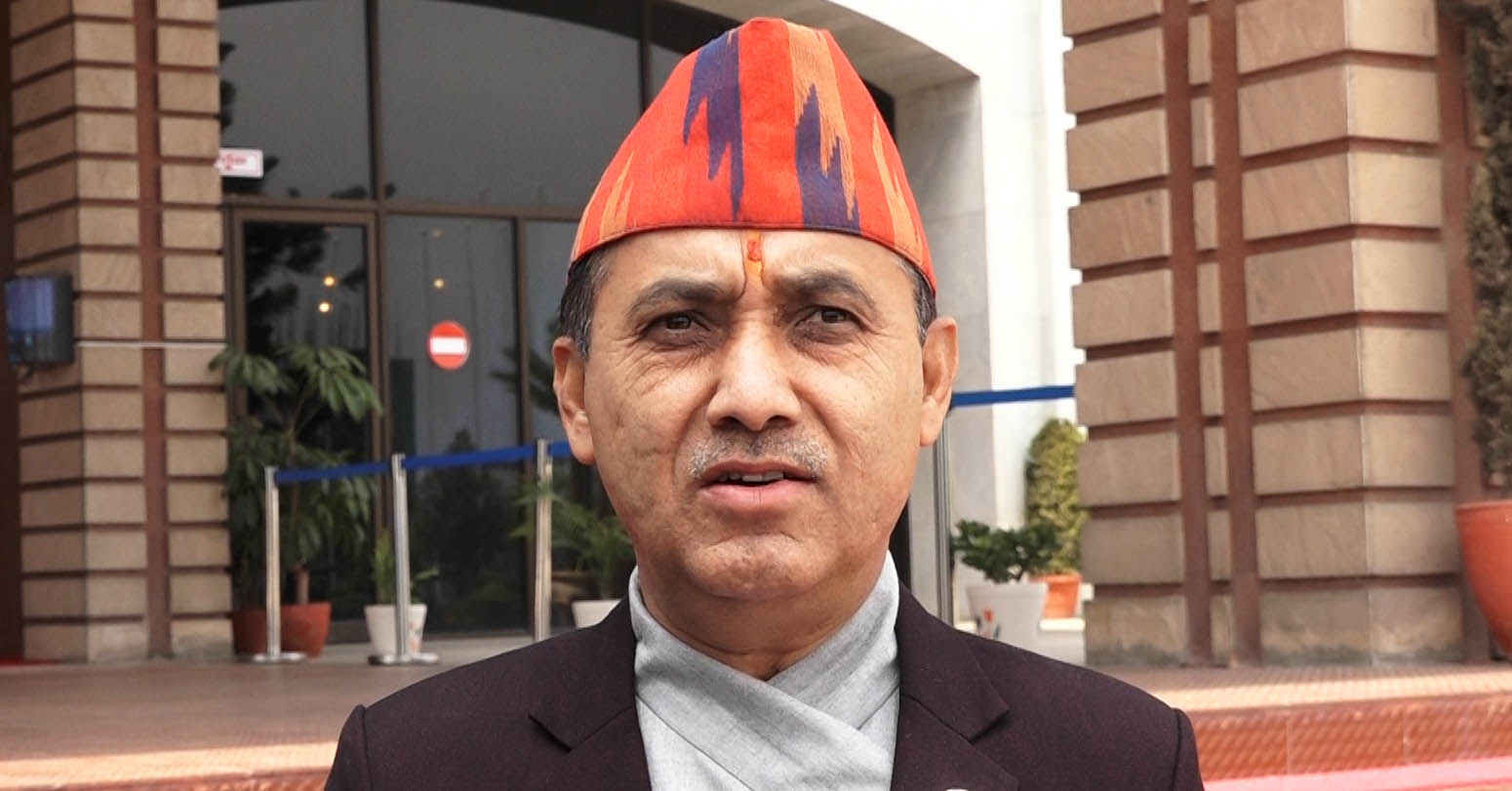
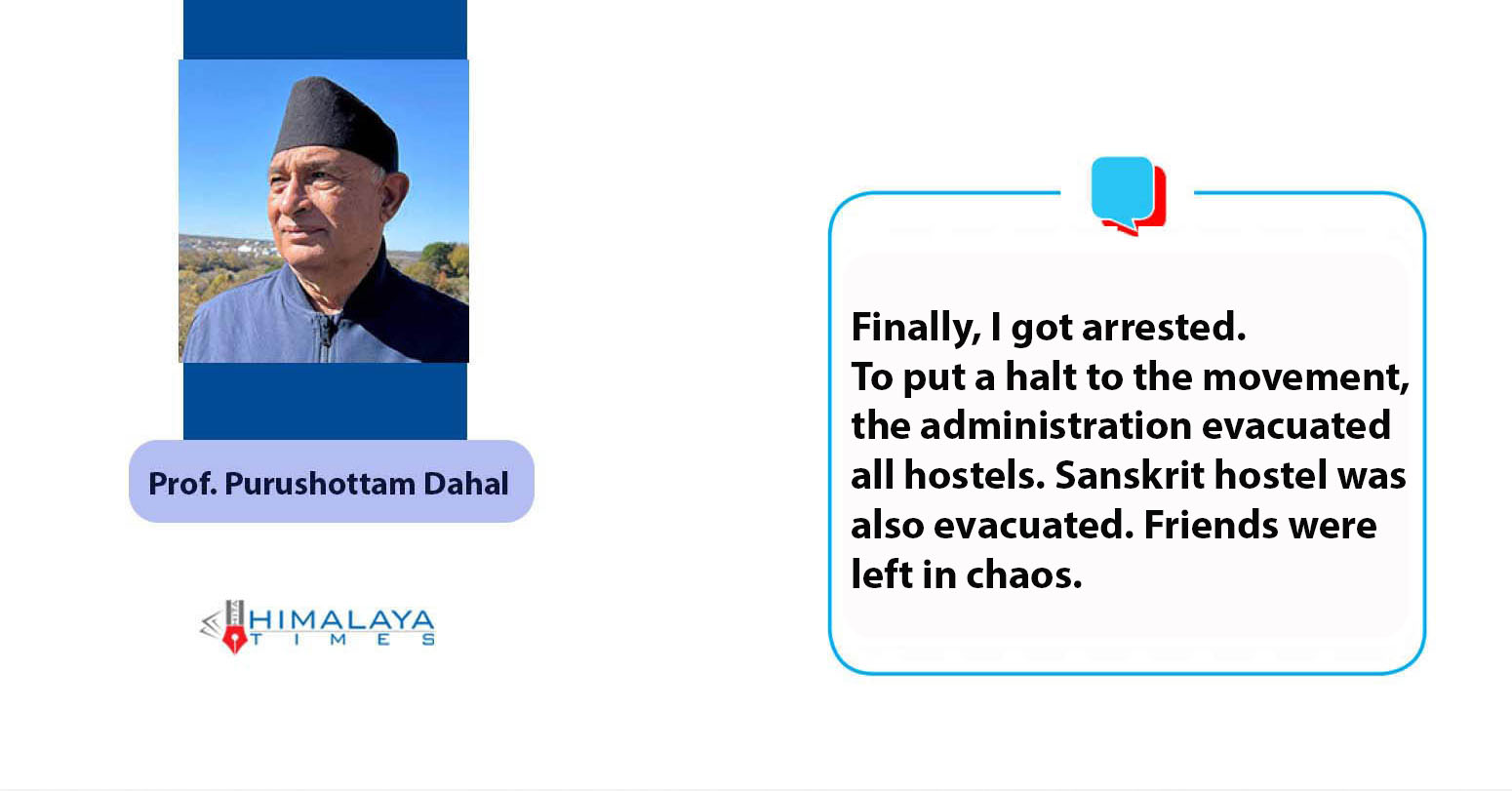

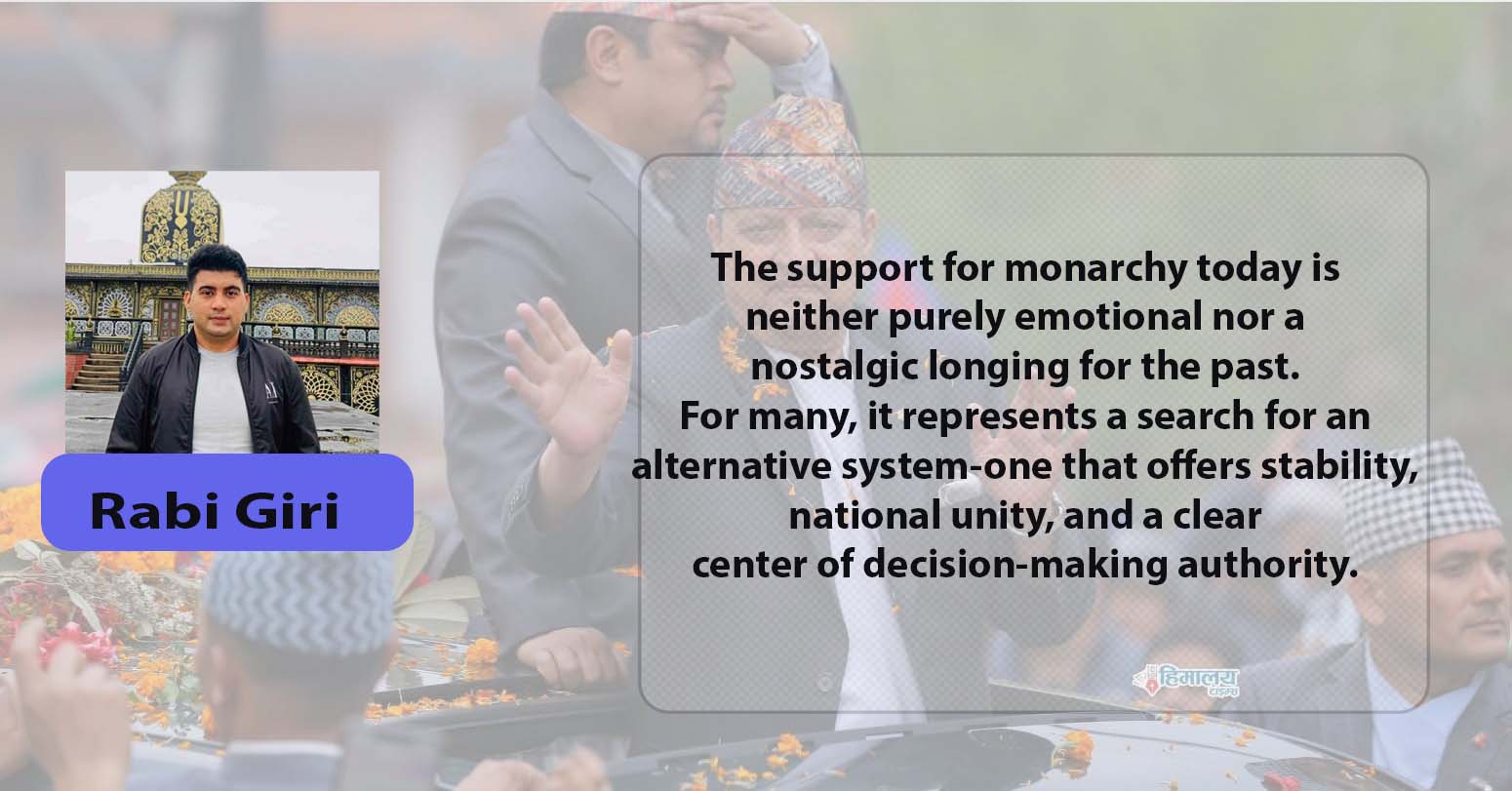


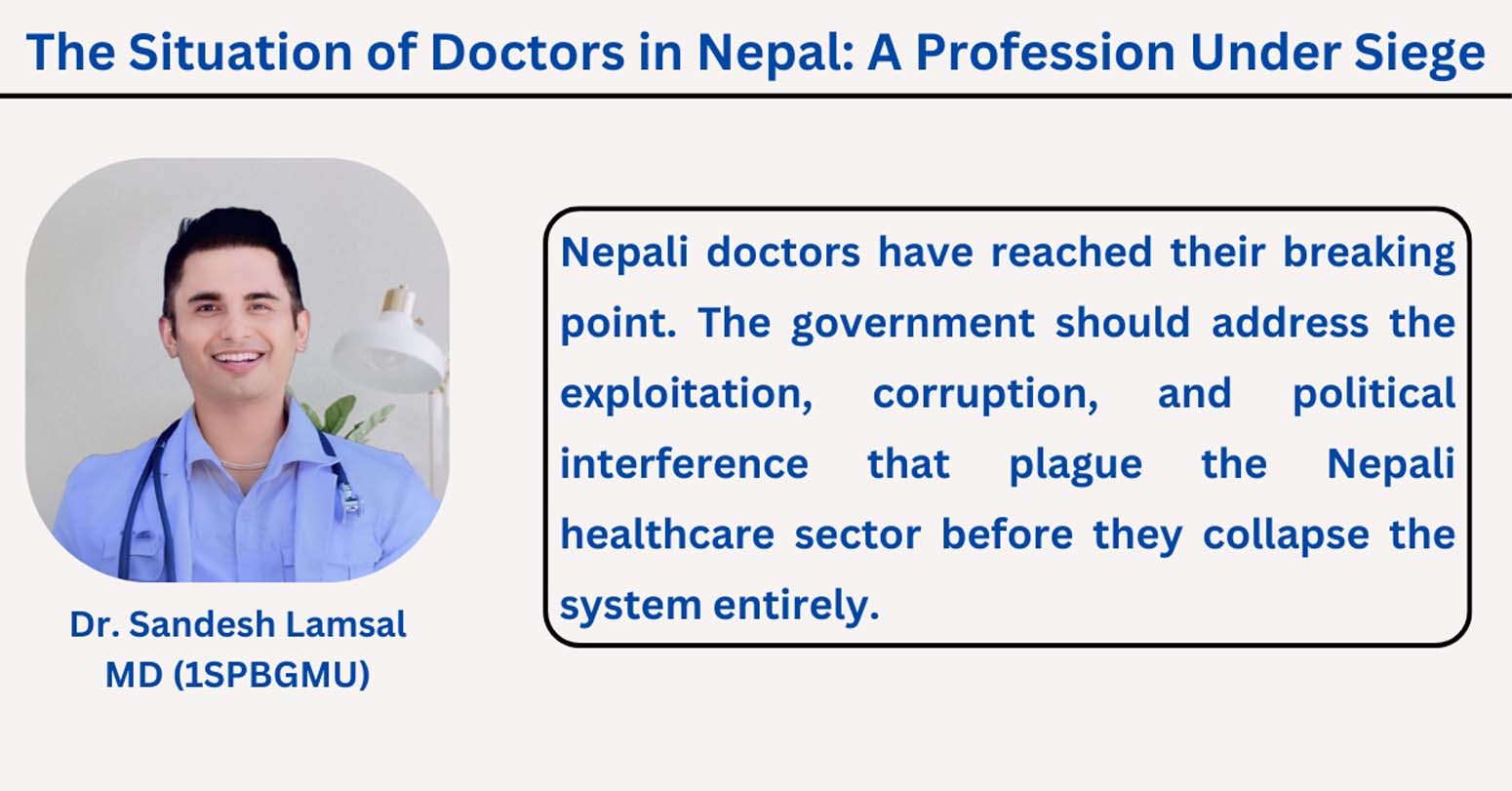

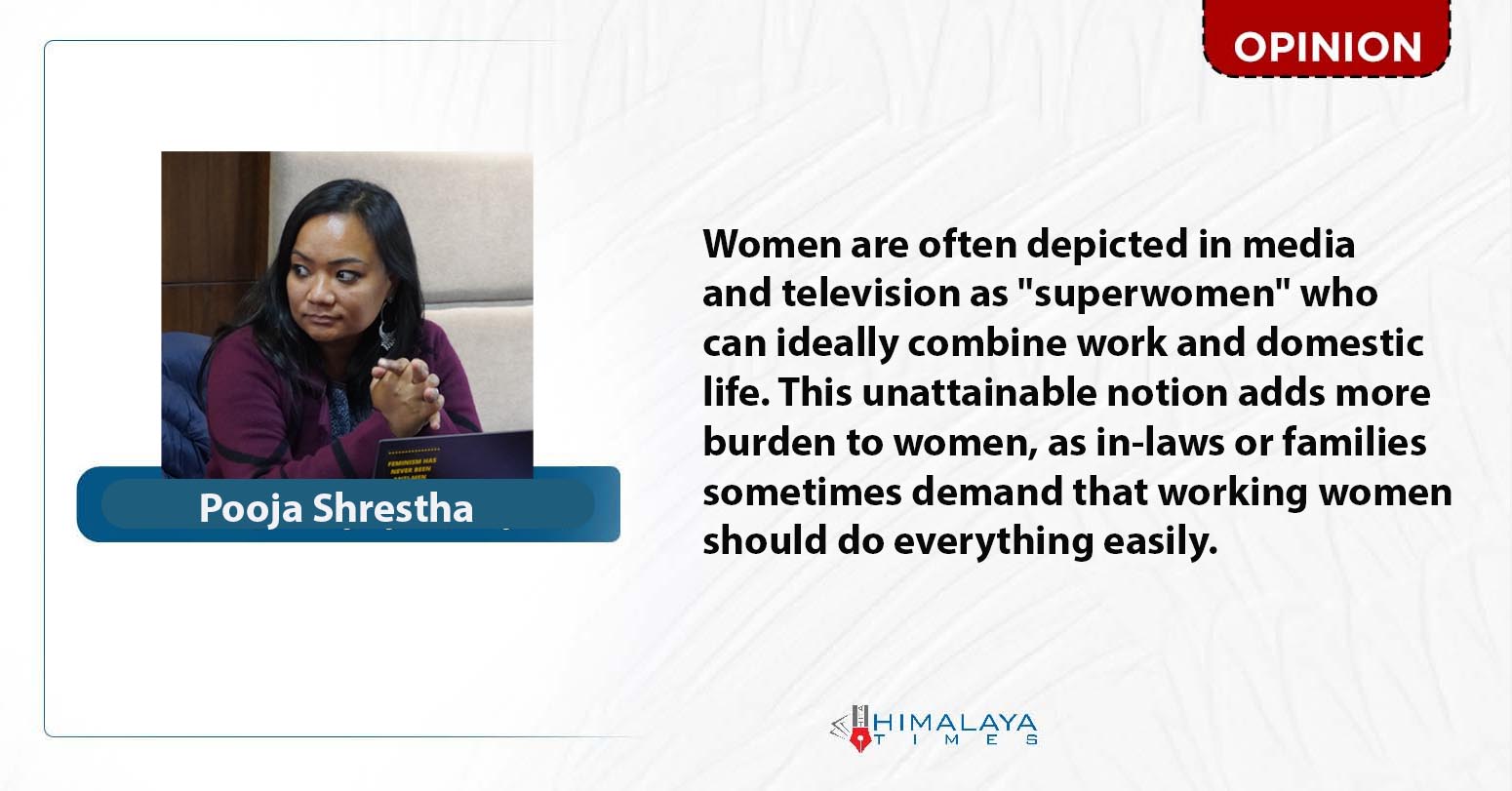

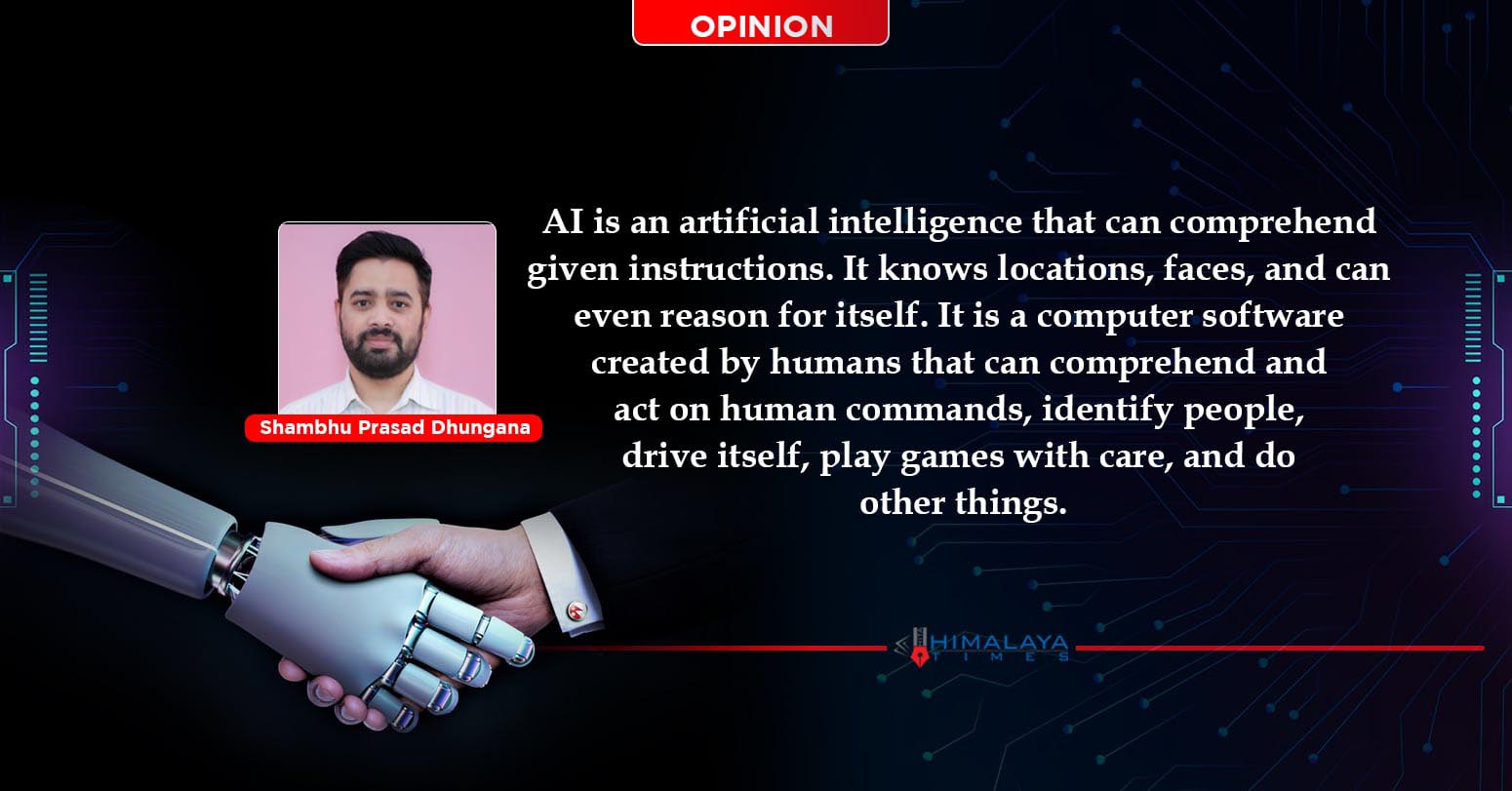
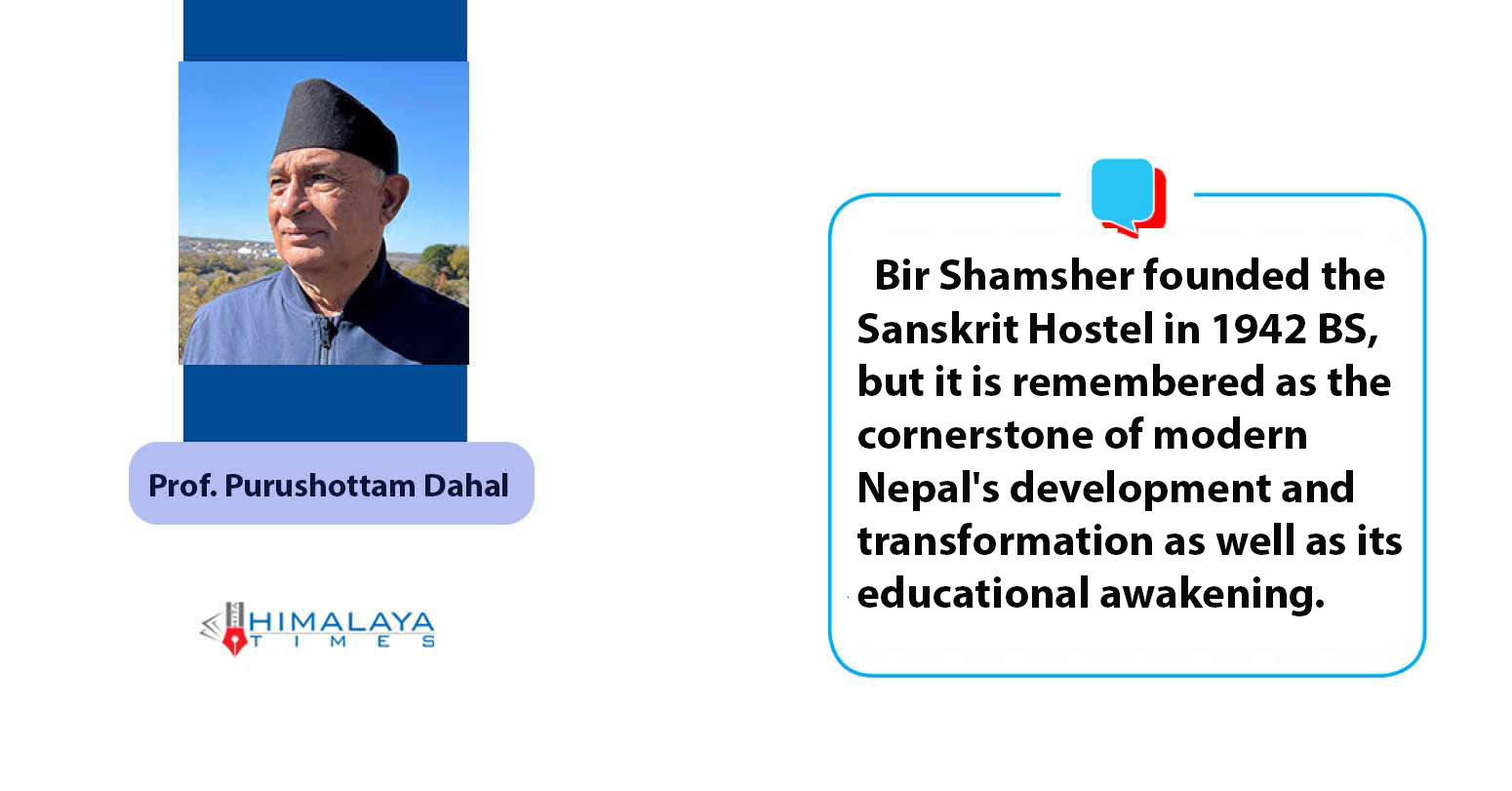
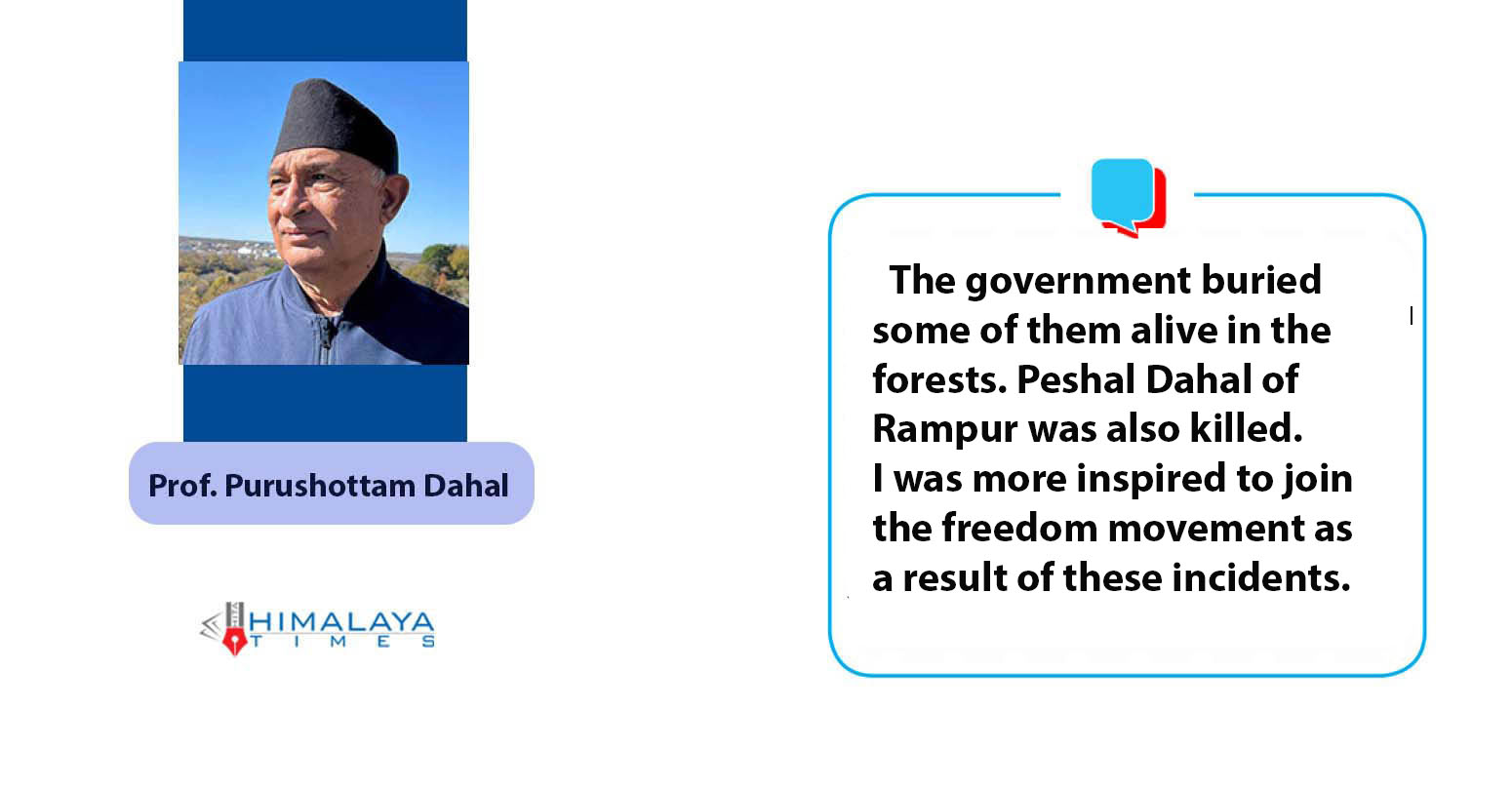
Middle-aged man spends millions to
Dr. Dharam Raj Upadhyay: Man
Breathing The Unbreathable Air
Comprehensive Data Protection Law Critically
Gender Differences In Mental Healthcare
Erosion of Democracy